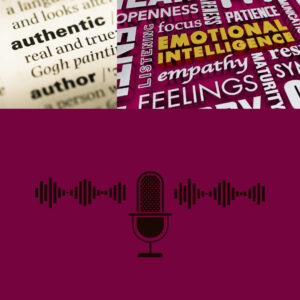Podcasting with Authenticity and Emotional Intelligence

I’ve recently been honored to be a guest on three fabulous podcasts. (See links at the bottom of the page) Kind of like always a bridesmaid and never the bride; I’m accustomed to being the host, not the guest. Before I accept any request to be a guest, I listen to several of the host’s previous episodes to get a feel for their approach. The two things I listen for are authenticity and emotional intelligence. Why? If you appear as a guest with a host who struggles, is only concerned about their side of the conversation, or asks pre-determined questions without regard for how your response may not be relevant to their next pre-determined question, it can reflect poorly on you, too.
Now, I’m not saying anything is wrong with prepared questions. Most good hosts do it all the time. You need some framework to keep on track. Instead, the space ‘between’ the questions is critical. It’s how the host treats the guest’s response that allows for a seamless segue between the questions that matter.
Here’s an example:
Host: When did you write the book?
Guest: I wrote it within days after my mother passed away. It was part of my healing process.
Host: What was your experience with your publisher like?
Guest: Say WHAT???
Perhaps the host could have said – Oh no, I’m so sorry to hear about your mother. I understand what it feels like to grieve. My mom passed away years ago, and it still hurts. How smart of you to take that grief and put it into words. Were you able to find a publisher who understood and felt your message?
Much better! The host was authentic, shared a bit about their experience, and, using emotional intelligence, began to create a real relationship with the guest.
So, with that, let’s talk about authenticity and emotional intelligence.
Authenticity: The Voice of Truth
Authenticity is the foundation upon which successful podcasts are built. Listeners are drawn to hosts who are genuine, vulnerable, and unafraid to share their true selves. Authentic podcasting involves being open about personal experiences, embracing imperfections, and admitting mistakes. By doing so, the host creates a safe and relatable space for their audience, fostering trust and a sense of belonging.
Emotional Intelligence: Building Genuine Connections
Emotional intelligence, often called EQ, encompasses recognizing, understanding, regulating one’s emotions, and empathizing with others. In podcasting, emotional intelligence is pivotal in forging genuine connections with guests and, therefore, the listeners.
Podcast hosts with a high EQ can pick up on subtle cues from their guests, such as tone of voice, timing, comments, or questions, and quickly adjust their approach accordingly. They recognize and address the emotional needs appropriately, providing empathy and support. This empathetic connection allows the host to create impactful and memorable content that resonates with their audience’s emotions.
The Synergy of Authenticity and Emotional Intelligence
Authenticity and emotional intelligence are not separate entities but are closely intertwined. Authenticity allows podcasters to tap into their emotional intelligence, while emotional intelligence sustains an authentic podcasting environment.
When podcasters are authentic, they create a space where emotional intelligence can thrive. By openly sharing personal stories, vulnerabilities, and successes, they encourage guests and listeners to reciprocate, engaging in an emotionally intelligent dialogue. This mutual vulnerability strengthens the bond between all involved, creating a unique and enduring connection beyond the podcast episode.
In the increasingly competitive landscape of podcasting, authenticity, and emotional intelligence are essential for success. Podcast hosts who embrace authenticity and emotional intelligence can create content that resonates deeply, forming lasting guest and audience connections.
And, after all, isn’t that what we want?
PR
Here are three authentic and emotionally intelligent hosts and shows. I hope you tune in.
Grace Sammon – The Storytellers
Melissa Crook – Embracing Layers
Cynthia James – Women Awakening
